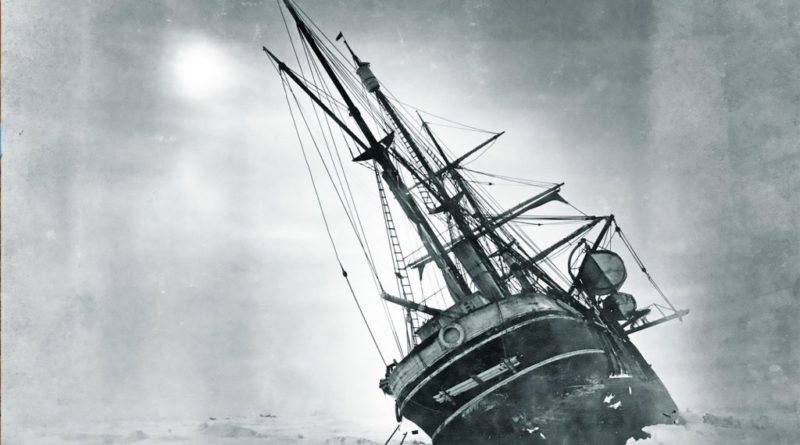Rejoignez les duos de conversation comme Colin (UK) et Laurent (F)
Lost and found: the extraordinary story of Shackleton’s Endurance epic.
Dear Friends, members of the Alliance Grenoble-Oxford and the Oxford-Grenoble Association, I am Colin Bloxham and I’m very pleased indeed to have been invited to prepare and record this short podcast on a wonderfully exciting subject, namely the discovery on March 9th of Sir Ernest Shackleton’s ship The Endurance in the vast depths of the Weddell Sea in Antarctica, at 3,000 metres.
This was a triumph for the scientific community and for the courageous adventurers who took part in the Endurance 22 expedition. They set sail from Cape Town on 5th February and headed for the treacherous seas and conditions of Antarctica. The Endurance 22 expedition was organised and funded by The Falklands Maritime Heritage Trust. It brought together world-leading marine archaeologists, engineers, technicians and sea-ice scientists on the S.A. Agulhas II, one of the largest and most modern polar research vessels in the world. The ship was built in Finland in 2012 and is now operated by the South African government’s Department of Environmental Affairs. It is one of the few that can operate in exceptionally dangerous, ice-bound seas and plays an important role in providing detailed data on the impact of climate change on the highly sensitive Polar Regions, which are warming far more quickly than more temperate latitudes.
The original Endurance expedition under the leadership of Sir Ernest Shackleton left South Georgia on 5th December 1914. South Georgia is a sparsely occupied island that lies approximately 1,400 kilometres south east of the Falkland Islands – better known in France, of course, as Les Malouines. On board were 27 crew members plus a stowaway, 69 dogs and a cat. Shackleton was aiming to establish a base on Antarctica’s Weddell Sea coast and from there head across the continent via the South Pole to the Ross Sea coast.
Within two days, the ship encountered the barrier of thick sea ice around the Antarctic continent. For several weeks, the Endurance made painstaking progress, but in mid-January a gale pushed the ice floes hard against one another and the ship was stuck – “frozen like an almond in the middle of a chocolate bar”, according to a crew member, Thomas Orde-Lees.
The men could do nothing but wait. After nine months of being gripped by ice, they abandoned the badly damaged ship, decamping on to the ice. From the ship they took food, bibles, books, clothing, tools, keepsakes and – crucially – three open lifeboats. The cat and some of the dogs were shot.
A few weeks later, on 21st November 1915, almost a year after they had set out, the Endurance finally sank. Using basic navigational tools, Frank Worsley, the ship’s captain and navigator, recorded its location. Without that information, it would almost certainly never have been found in 2022.
The men formed a plan to march across the ice towards land. But after travelling just seven and a half miles (12km) in seven days, they gave up. “There was no alternative but to camp once more on the ice floe and to possess our souls with what patience we could till conditions should appear more favourable for a renewal of the attempt to escape,” wrote Shackleton.
When the ice broke up the following April, the crew took to the lifeboats, rowing to Elephant Island, a remote and uninhabited outcrop. The men were exhausted, some afflicted by sea sickness, others convulsed with dysentery. “At least half the party were insane,” wrote Frank Wild, Shackleton’s second in command.
But they made it. On 15th April they clambered ashore on Elephant Island. It was the first time the men had stood on solid ground in almost 500 days. After nine days of recuperation, Shackleton, Worsley and four others took one of the boats another 8oo miles (1,300km) across rough seas and in biting winds to South Georgia. “The boat tossed interminably on the big waves under grey, threatening skies. Every surge of the sea was an enemy to be watched and circumvented,” wrote Shackleton. It took 16 days to reach their destination. It was an extraordinary feat of survival, but their epic journey was not yet over. Three of the men, including Shackleton, then crossed South Georgia’s peaks and glaciers to reach a whaling station on the other side of the island. In August, after several failed attempts, a rescue party set out for Elephant Island, where the remaining 22 crewmen were waiting.
Sir Ernest Shackleton’s expedition provided a badly needed story of heroism during the dark days of the First World War. Born in Ireland in 1874, Shackleton was one of the most remarkable leaders during the pioneering days of Antarctic exploration in the early years of the 20th century. He took part in the 1901 expedition led by Captain Robert Scott, known as “Scott of the Antarctic”, and almost reached the South Pole before falling ill. In 1908, he returned to the Antarctic as the leader of his own expedition, on the ship Nimrod. During the expedition, his team climbed Mount Erebus, made many important scientific discoveries and set a record by coming even closer to the South Pole than before. It was, however, the Norwegian explorer Roald Amundsen who was the first to reach the South Pole in 1911, followed by Scott, who died sadly on the return journey.
I hope you have been inspired by these extraordinary stories, both those of the early pioneers and that of the remarkable science being undertaken by contemporary explorers, so critical to our understanding of the impact of climate change. I should acknowledge The Guardian newspaper as the source for much of this podcast and wish to thank my friends in the Alliance Grenoble-Oxford for this opportunity.
Colin Bloxham, March 2022





of course like your web site however you need to take a look at the spelling on several of your posts. A number of them are rife with spelling problems and I find it very troublesome to inform the reality nevertheless I¦ll certainly come again again.